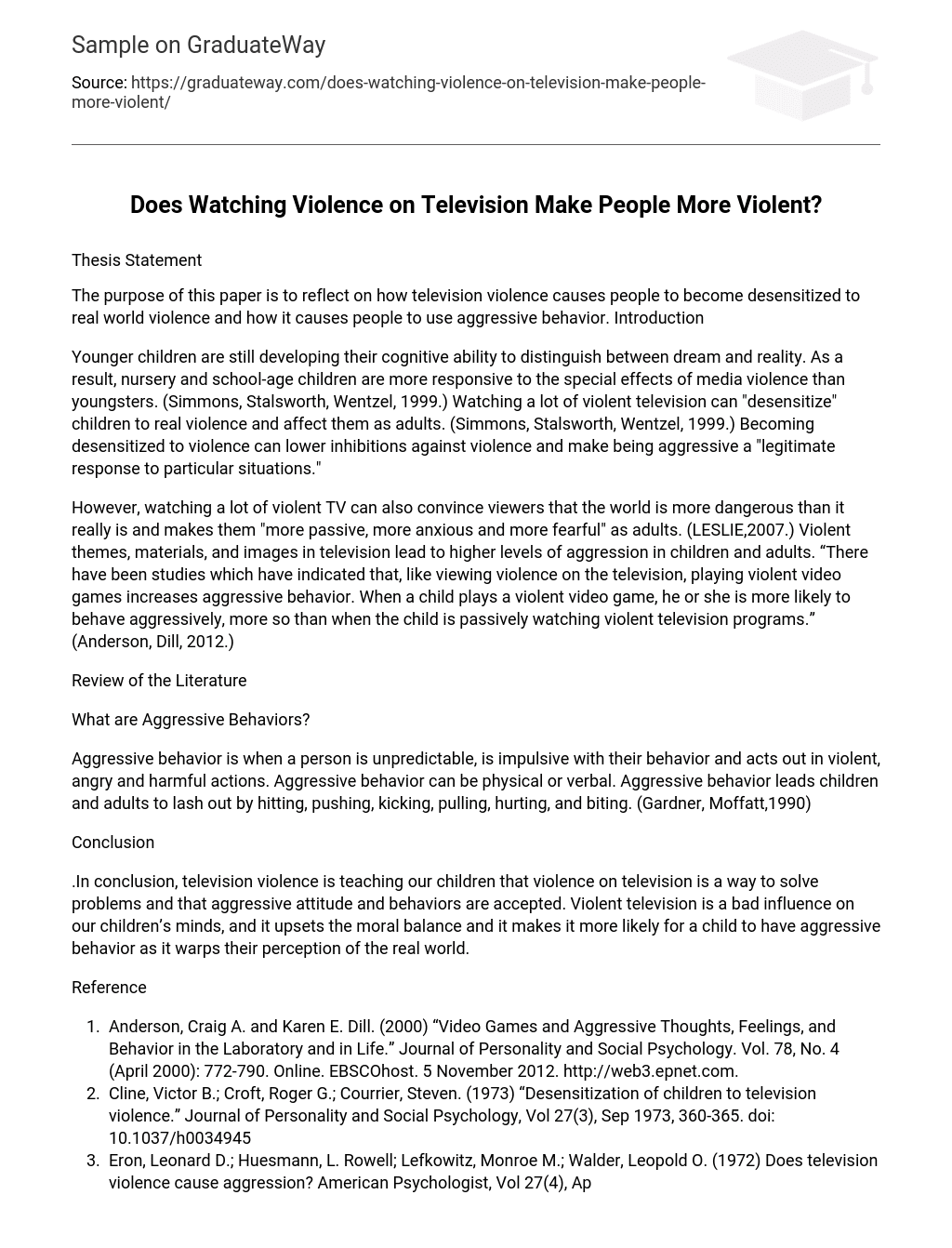Thesis Statement
The purpose of this paper is to reflect on how television violence causes people to become desensitized to real world violence and how it causes people to use aggressive behavior. Introduction
Younger children are still developing their cognitive ability to distinguish between dream and reality. As a result, nursery and school-age children are more responsive to the special effects of media violence than youngsters. (Simmons, Stalsworth, Wentzel, 1999.) Watching a lot of violent television can “desensitize” children to real violence and affect them as adults. (Simmons, Stalsworth, Wentzel, 1999.) Becoming desensitized to violence can lower inhibitions against violence and make being aggressive a “legitimate response to particular situations.”
However, watching a lot of violent TV can also convince viewers that the world is more dangerous than it really is and makes them “more passive, more anxious and more fearful” as adults. (LESLIE,2007.) Violent themes, materials, and images in television lead to higher levels of aggression in children and adults. “There have been studies which have indicated that, like viewing violence on the television, playing violent video games increases aggressive behavior. When a child plays a violent video game, he or she is more likely to behave aggressively, more so than when the child is passively watching violent television programs.” (Anderson, Dill, 2012.)
Review of the Literature
What are Aggressive Behaviors?
Aggressive behavior is when a person is unpredictable, is impulsive with their behavior and acts out in violent, angry and harmful actions. Aggressive behavior can be physical or verbal. Aggressive behavior leads children and adults to lash out by hitting, pushing, kicking, pulling, hurting, and biting. (Gardner, Moffatt,1990)
Conclusion
.In conclusion, television violence is teaching our children that violence on television is a way to solve problems and that aggressive attitude and behaviors are accepted. Violent television is a bad influence on our children’s minds, and it upsets the moral balance and it makes it more likely for a child to have aggressive behavior as it warps their perception of the real world.
Reference
- Anderson, Craig A. and Karen E. Dill. (2000) “Video Games and Aggressive Thoughts, Feelings, and Behavior in the Laboratory and in Life.” Journal of Personality and Social Psychology. Vol. 78, No. 4 (April 2000): 772-790. Online. EBSCOhost. 5 November 2012. http://web3.epnet.com.
- Cline, Victor B.; Croft, Roger G.; Courrier, Steven. (1973) “Desensitization of children to television violence.” Journal of Personality and Social Psychology, Vol 27(3), Sep 1973, 360-365. doi: 10.1037/h0034945
- Eron, Leonard D.; Huesmann, L. Rowell; Lefkowitz, Monroe M.; Walder, Leopold O. (1972) Does television violence cause aggression? American Psychologist, Vol 27(4), Apr 1972, 253-263. doi: 10.1037/h0033721 Gardner, W. I., & Moffatt, C. W. (1990). Aggressive behaviour: Definition, assessment, treatment. International Review Of Psychiatry, 2(1), 91-100. doi:10.3109/09540269009028275
- Huesmann, L. R. (1986), Psychological Processes Promoting the Relation between Exposure to Media Violence and Aggressive Behavior by the Viewer. Journal of Social Issues, 42: 125–139. doi: 10.1111/j.1540-4560.1986.tb00246.x
- LESLIE, K. (2007, Jan 17). Children exposed to too much violence in the media, parents, teachers warn. Canadian Press NewsWire. Retrieved from http://search.proquest.com/docview/359906788?accountid=32521
- Simmons, B. J., Stalsworth, K., & Wentzel, H. (1999). Television violence and its effects on young children. Early Childhood Education Journal, 26(3), 149-153. doi: http://dx.doi.org/10.1023/A:1022925301026
- Vincent M. Rue (1974) Television and the Family: The Question of Control The Family Coordinator , Vol. 23, No. 1 (Jan., 1974), pp. 73-81 Published by: National Council on Family Relations Article Stable URL: http://www.jstor.org/stable/582528





